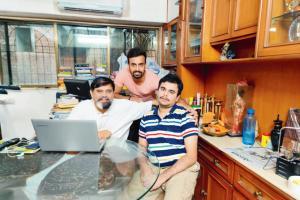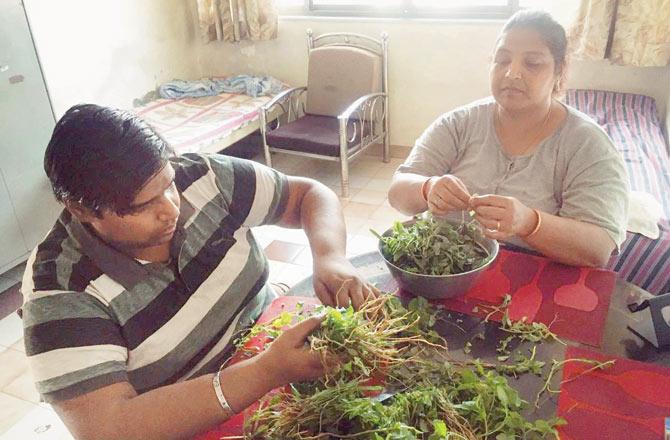Forced to step out of comfortable routines, parents of Mumbai's specially-abled children are learning new ways of helping them cope and keep them engaged

Achyut Godbole with special educator Hanumant Khandagale and son Nihar. Khandagale has moved to the Godboles' Andheri home
When the lockdown was announced, Hanumat Khandagale moved from his home in Borivli to live with the Godboles in Andheri West. Khandagale is an educator for special children, and the Godboles have known him for five years now. Their son Nihar, a 37-year-old with autism, had been attending special sessions conducted by Khandagle.
Nihar's father is Achyut Godbole, a well-known Marathi writer. The 70-year-old explains that while they have been involving their son in household chores, the lockdown period has proven rather difficult.
ADVERTISEMENT
"Nihar has been helping with household chores since he was a child. After all, chores such as cleaning coriander or sorting vegetables or clothes are activities that can boost hand-eye coordination and other cognitive abilities. Cleaning the house or helping parents in other activities also develops a sense of belongingness in differently abled people. And now, all these habits are really helping us keep him calm and engaged," says Achyut. Yet, the extended period of not being able to step out of the house can be difficult on those with cognitive disabilities. Keeping them calm during this period is a challenge. As the Godboles are senior citizens, Khandagale has moved base temporarily to help them handle Nihar physically.

Bhandup resident Sunita Sharma had a rough time explaining to her autistic son, Satyam, why he couldn't step out, until she showed him the empty streets and closed shops
Khandagale who has been working with Dhanyawad Divyang Foundation in Borivli for the last few years, has family outside of Mumbai. He says, "I could take this step as I do not have to take much responsibility of my family. It is not possible for all special educators when already there are so few people working in this sector. Nihar is completely self-dependant. But if he gets angry or throws tantrums, I can help keep him calm."
While the lockdown is posing several social challenges, it has been particularly difficult for families with specially-abled persons, for whom a disruption in routine can often throw things out of gear.
Spending a few hours each day at the special education centre, not only allowed the children to engage in different activities and work on their self-dependence, it also allowed their parents time to get along with their own work. And, even as the parents are finding it difficult to explain the lockdown to their children, a bigger task is to keep them busy, so that they are mentally stable, active and happy. Some of Mumbai's schools have started online sessions with fun activities and counselling sessions via video calls, but the formula doesn't work on all children as some require customised, in-person interaction.
Archana Rao, co-founder of Cheerful Connect that works for inclusion in education, and has a large digital presence, says, "The challenges begin from coexistence in one house. In many families, there are members who are not always home, now present all the time. This can be a difficult scenario for special children to adjust to. Temper tantrums and other behavioural changes are bound to take place, especially when expert provided specially designed therapy sessions are not available. Many of them also have sensitivity issues, such as those related to the skin, making it difficult for them to understand the need to continually wash hands."
It's the sudden proximity of family members that's rocking the life of the Bhandup-based Sharmas.
Sunita Sharma's twins—23-year-old Satyam and Shivam—have autism. "It was a difficult task to make Satyam understand why he is not allowed to go out. But when I showed him the outside world through the window, he could sense the difference as the roads were empty, shops were shut and he could not see anybody. It takes time, but they do understand. One just has to find novel ways," she says.
While Shivam has made great progress—from not being able to talk till he was six years old, to completing his graduation and now working—Satyam needs constant care. "The initial few days were very difficult as Satyam would not let his father be around for the entire day. On normal days, Satyam would meet his father once in a day in the morning. By the time he returned, Satyam was asleep. Now, due to the lockdown, my husband is home 24/7. Satyam finds it difficult to adjust to this. My husband had to spend the first few days in isolation inside his bedroom," she laughs.
Farida Asrani, principal of Child Reach School in Santa Cruz West, reiterates the importance of involving specially abled children in household chores, which are not dangerous and are also good learning tools. "Many of the students who come to us don't have Internet at home. So, our teachers have developed ways to keep them busy by training their parents to do different activities including art, craft and performance."
37
Nihar Godbole's age. While he is self-dependant, he needs to be kept engaged
Catch up on all the latest Crime, National, International and Hatke news here. Also download the new mid-day Android and iOS apps to get latest updates
 Subscribe today by clicking the link and stay updated with the latest news!" Click here!
Subscribe today by clicking the link and stay updated with the latest news!" Click here!







